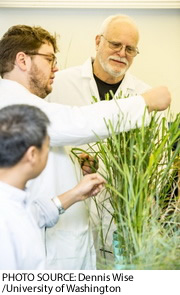
Engineers Develop Transgenic Grass that Neutralizes Toxic Pollution from Bombs, Explosives, and Munitions
December 1, 2016| |
 Explosives and munitions used in military bases leave behind toxic compounds, contaminating millions of acres of U.S. military bases with an estimated cleanup bill ranging between US$16 billion and US$165 billion.
Explosives and munitions used in military bases leave behind toxic compounds, contaminating millions of acres of U.S. military bases with an estimated cleanup bill ranging between US$16 billion and US$165 billion.
Researchers from University of Washington and University of York have engineered new transgenic grasses that can neutralize and eradicate RDX, a toxic compound that has been widely used in explosives since World War II. The engineers introduced two genes from bacteria that learned to eat RDX and break it down into harmless components in two perennial grass species: switchgrass (Panicum virgatum) and creeping bentgrass (Agrostis stolonifera).
In the first reported demonstration of genetically engineered grasses to remove contamination from the environment, the best-performing strains removed all the RDX from a simulated soil in which they were grown within less than two weeks, without retaining any of the toxic chemical in their leaves or stems.
For more details, read the news release from the University of Washington website.
| |
Biotech Updates is a weekly newsletter of ISAAA, a not-for-profit organization. It is distributed for free to over 22,000 subscribers worldwide to inform them about the key developments in biosciences, especially in biotechnology. Your support will help us in our mission to feed the world with knowledge. You can help by donating as little as $10.
-
See more articles:
-
News from Around the World
- Students Launched the First Scientific Internet Radio Station in Egypt
- Uganda PM Advocates for Biotech at NARO-MAK Conference
- Ethiopia to Commercialize Bt Cotton in Two Years
- Scientists Find Single Enzyme Controling Growth and Defense Hormones
- Australian OGTR Receives License Application for Field Trial of GM Wheat
- Researchers Reveal Characteristics of Plant Defense Compound Dhurrin
-
Research Highlights
- Scientists Engineer Maize to Produce Astaxanthin
- Study Reveals the Defense Roles of Soybean GmAFS Gene Against Nematodes and Insects
-
Beyond Crop Biotech
- Engineers Develop Transgenic Grass that Neutralizes Toxic Pollution from Bombs, Explosives, and Munitions
-
From the BICs
- Filipino Students Showcase Biotech in Bag Designs
- NaCRRI Hosts ABNE Technical Advisory Team, Looks into Strengthening Biosafety Capacity
- Biotech Stakeholders Informed about New Regulation in Indonesia
-
Announcements
- Plant Genomics and Gene Editing Congress - Europe
-
Plant
- Challenges in Genome Editing of Sugarcane
- Public Acceptance of Food Products from Genome-Edited Crops
-
Read the latest: - Biotech Updates (December 17, 2025)
- Gene Editing Supplement (December 17, 2025)
- Gene Drive Supplement (February 22, 2023)
-
Subscribe to BU: - Share
- Tweet
